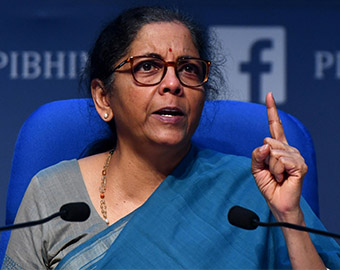Gallery
 PM Modi visit USA
PM Modi visit USA Only the mirror in my washroom and phone gallery see the crazy me : Sara Khan
Only the mirror in my washroom and phone gallery see the crazy me : Sara Khan Karnataka rain fury: Photos of flooded streets, uprooted trees
Karnataka rain fury: Photos of flooded streets, uprooted trees Cannes 2022: Deepika Padukone stuns at the French Riviera in Sabyasachi outfit
Cannes 2022: Deepika Padukone stuns at the French Riviera in Sabyasachi outfit Ranbir Kapoor And Alia Bhatt's Wedding Pics - Sealed With A Kiss
Ranbir Kapoor And Alia Bhatt's Wedding Pics - Sealed With A Kiss Oscars 2022: Every Academy Award Winner
Oscars 2022: Every Academy Award Winner Shane Warne (1969-2022): Australian cricket legend's life in pictures
Shane Warne (1969-2022): Australian cricket legend's life in pictures Photos: What Russia's invasion of Ukraine looks like on the ground
Photos: What Russia's invasion of Ukraine looks like on the ground Lata Mangeshkar (1929-2022): A pictorial tribute to the 'Nightingale of India'
Lata Mangeshkar (1929-2022): A pictorial tribute to the 'Nightingale of India' PM Modi unveils 216-feet tall Statue of Equality in Hyderabad (PHOTOS)
PM Modi unveils 216-feet tall Statue of Equality in Hyderabad (PHOTOS)JSW Soorma Hockey Club are a step away from qualifying to the final of the Women’s Hocke
- Aus Open: Sinner survives early test to begin title defense
- Shiva Thapa, Sachin Siwach shine on Day 2 of men’s Boxing Nationals
- Freya Deshmane wins gold in first Winter Horse Show organised by Amateur Riders’ Club
- Salah sets Premier League record in Liverpool's draw at Newcastle
- India Open Competition in Shotgun begins in Jaipur, paving way for Nationals' qualification
Downgrading credit rating amid pandemic limits policy options: Sitharaman Last Updated : 19 Jul 2020 01:02:23 AM IST 
Union Finance Minister Nirmala Sitharaman Union Finance Minister Nirmala Sitharaman on Saturday made a strong case for rating agencies to refrain from frequent rating downgrades during the prevailing Covid-19 pandemic, which has put economies across the globe under stress and raised the need to increase spending even at the cost of enlarging deficits.
Participating in the 3rd G20 Finance Ministers and Central Bank Governors ( FMCBG) meeting under the Saudi Arabian Presidency through video conferencing , Sitharaman said that procyclicality of credit rating downgrades by the rating agencies was an issue in current times, especially with regard to its deterrent impact on policy options, particularly for emerging market economies such as India.The economic stress which the Covid-19 pandemic has brought about has not been seen by the rating agencies differently as they downgraded their ratings for several economies, including India.In early June, Moody's downgraded India's rating by a notch to ‘Baa3' for the first time in two decades. Fitch Ratings has also revised downward its rating outlook for India from stable to negative, while S&P Global Ratings affirmed 'BBB-' credit ratings for India.A rating downgrade in current times puts extra stress on the governments and the industries to mobilise overseas funding for domestic spending. It also impacts the investment cycle.Sitharaman said that the G-20 Action Plan in the Covid-19 times would require international coordination in addressing the spill-over effects of exit strategies.Emphasising that the Action Plan needs to reflect on how the economies are balancing their supply side and demand side measures in response to Covid-19, the Finance Minister shared with her counterparts how India is working on ensuring this balance through credit schemes for greater liquidity, direct benefit transfers, and employment guarantee schemes.In this regard, she specifically referred to India's comprehensive economic package to address recovery and growth amounting to over $295 billion, about 10 per cent of the country's GDP.The G-20 meeting was organised to discuss the global economic outlook amid the evolving Covid-19 pandemic crisis along with other G20 Finance Track priorities for the year 2020.In the first session, Sitharaman talked about the G20 Action Plan in response to Covid-19 which was endorsed by the G20 Finance Ministers and central bank Governors in their previous meeting on April 15.This G20 Action Plan lays out a list of collective commitments under the pillars of Health Response, Economic Response, Strong and Sustainable Recovery and International Financial Coordination, aimed at coordinating G20 efforts to fight the pandemic.In the second session of the meeting, the G20 Finance Ministers and central bank Governors discussed the developments on G20 Finance Track deliverables under the Saudi Arabian Presidency.During this session, the Finance Minister shared some of the policy measures taken by the Government of India to fight the pandemic, including direct benefit transfers, special support to agriculture and MSME sectors, rural employment guarantee measures etc.Sitharaman particularly highlighted how India has successfully employed technology-based financial inclusion by harnessing the nationwide digital payment infrastructure that India has built in the last five years, to make contactless cash transfers of over $10 billion into the bank accounts of 420 million people.She also referred to the swift measures to provide free food grains to over 800 million people for eight months till November 2020.IANS New Delhi For Latest Updates Please-
Join us on
Follow us on








172.31.16.186







